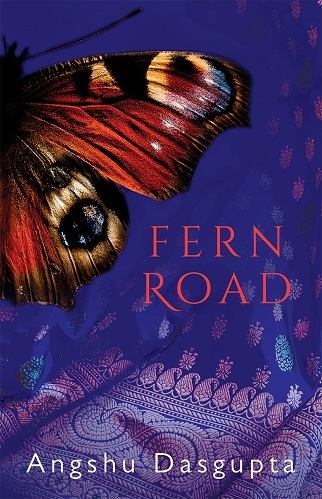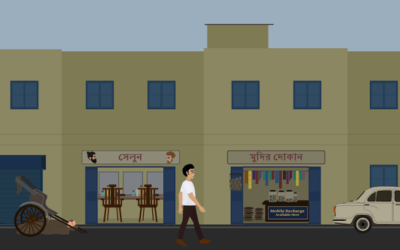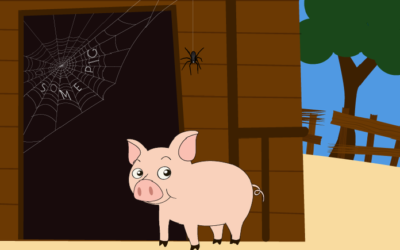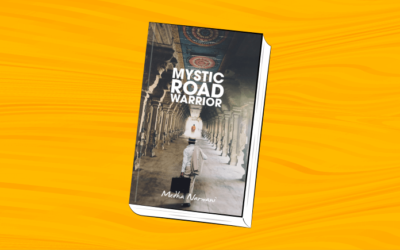Excerpt
Fern Road

In December, the mornings are grey, the afternoons short and yellow, like the final moments of an ant drowning in a jar of honey. Sweaters, scarves and shawls emerge from the top shelves of wardrobes and from steel trunks stowed under beds. There’s a faint smell of mothballs in minibuses and in doctors’ chambers. Men and women scurry about the wispy morning streets, wrapped in their woollens of blue and yellow and brown. On Sundays they go to the Botanic Gardens and to the zoo, with sandwiches wrapped in old newspaper and thermos bottles of instant coffee, not quite piping hot. They recline on reed mats spread on the green, while their children play hide-and-seek or immerse themselves in adventures that can only take place in the pages of a book. Evening falls without warning. Feeble street lamps shine valiantly, illuminating huddled figures with plumes of cigarette smoke floating over their heads like speech bubbles in a comic book.
The grey mornings and the quick afternoons bleed into the new year, and the men and women spend their time and money at the fairgrounds by the maidan. They’re in trams and buses with armloads of books, a heady new book smell about them. Late in the evening, they wrap themselves in their shawls and drink tea, piping hot, from earthen cups before spending the night seated on uncomfortable chairs in concert halls fashioned out of tarpaulins and bamboo scaffolding.
Orko can’t remember a winter as idyllic as this one. His board exams are behind him. He is home, alone, swaddled in a soft shawl that had once belonged to his mother. The shawl is a fuzzy mauve, and it too smells of mothballs. The hours go by languidly, with Simon & Garfunkel playing on the stereo. Orko doesn’t know how long he’s been reading, only that it has been too long – the text on the page grows fuzzy, then fades into an unintelligible blur. He sets the book down by his pillow and contemplates his future, stringing together vignettes of an imagined adulthood. It’s a frustrating exercise, because he can never place his future self in these vignettes.
Priya is born in a lazy, ill-considered moment, to take Orko’s place in these imaginings. She lives here, in this room. Her given name is Orkopriya, but her mother called her Orko. She had chosen that name before Priya was born, in anticipation of a son. To her friends, though, she’s Priya, because Orko is a boy’s name.
In the beginning, Priya is just an apparition; a wraith who appears only in the dead of night, or early in the afternoon, when the world is bathed in honey. Orko isn’t alarmed, because he knows her from the sketches in his mother’s notebook. She reminds him of a song about moonbeams and fairytales. He watches her wistfully, enviously, with the knowledge that he is Orko and she is Priya, and that one could never be the other. She is graceful, like a ballerina, and he is like Pinocchio, his arms and legs held together with twine. She is self-assured – cocky, even – and he is the embodiment of infinite hesitation.
Priya has a wing, shaped like a butterfly’s, and striped like a zebra. She can’t fly on the one wing, of course, but she likes the way it looks. She pictures herself, naked, the wing resting against her shoulder blade. She wishes she had another wing so that she could fly away. She stands at the window, her wing in mourning for its lost twin. Orko wishes she would go away, and she does.
When she returns, she is no longer a wraith, and no longer benign. She begins to carve out portions of Orko’s life and claim them for herself. Soon there’s a poster of Boy George brushing up against Tracy Chapman, and by the stereo there’s a jewelled box made of silver. Inside the box are four pairs of earrings. The little golden hoops are the only pair she’s allowed to wear to school, but the ones she loves most are the silver owls that nestle against her earlobes. She only wears those in the evenings, because owls don’t like grey mornings or yellow afternoons.
Priya taunts Orko with visions of futures that could never be his. She’s a singer, and a songwriter. She plays the flute, the dulcimer, the guitar and the piano. She speaks French and Japanese, fluently. She’s a mystery writer. She’s the first human on Mars. She’s a champion swimmer. She has two children, and she takes them swimming every afternoon.
Orko envies Priya, but it isn’t because she’s so accomplished, or because she has two children. He envies her for the secrets she shares during sleepovers at Urmi’s, under a duvet so roomy that there’s four of them in there, with room to spare. He resents her because she plays games with his memories, painting pictures of a past that might have been his if he were a girl. It’s Priya who sat with Urmi on her terrace, reading, eating puffed rice and fighting over the boy in the book. Priya had her ears pierced first, and Urmi envied her for the beautiful earrings she wore to school. When she went swimming with her mother, she was never sent away to the men’s changing rooms. When the boys on the football field taunted her with that jaded trope about cows and flowers, she had the last laugh; she ran circles around them during the game that followed. When Bishu asked her to take her clothes off, Priya chopped off his penis with a machete.
When the doorbell rings, Priya leaves, taking with her the poster of Boy George and the little jewelled box from beside the stereo, and Orko is left floundering, gasping, clutching at thin air in an effort to piece together a future in which he can participate as himself. He knows that he’s never going be able to play the dulcimer or the flute, and he’s not going to be an astronaut. He’s never going to marry, or have children, or wear silver owls on his earlobes. Nevertheless, he decides that he isn’t going to remain friendless and alone just because he isn’t a girl; he isn’t going to try to walk like a man, or sit or carry his books like one, because the idea that somehow one could learn to do that seems preposterous. He is tired of being afraid. He is going to go back to the football field, and he is going to run. He’s going to become strong and confident, like his mother. In the meantime, if Bishu tries to speak to him, he is going to keep on running until he reaches home; Urmi’s mother told her to run as fast as she could if strange men tried to talk to her.

Angshu Dasgupta is fascinated by words and their meanings, and has an irrational weakness for syncopated rhyme. He began writing while in college, inspired by the words and the music of Joni Mitchell. His first novel, Fern Road, was published 20 years later. Angshu lives in Kolkata, with his spouse and two teenage daughters. He is a computer programmer by profession. He can sometimes be found riding a motorbike in the Eastern Himalayas, all by himself.
Excerpted with permission from Fern Road, Angshu Dasgupta, Speaking Tiger, available online and at your nearest bookstore.




I read this excerpt, was confused who exactly Priya was, then looked up this book and read the reviews and summary on Amazon. Now I want to buy the book and read it, so this excerpt has done its job.
It’s wonderfully evocative, I spent my early childhood in Calcutta in the early 90s, and all this brings back a rush of memories. The Book Fair in the dusty Maidan, the people muffled in sweaters and mufflers and monkey-caps when it’s barely cold.
I was struck that the descriptions seem written as if the author is reading them in a book, rather than trying to create an illusion that they exist in reality. Don’t know whether this was deliberate. “Cigarette smoke like speech bubbles in a comic-book”; “adventures that can only happen in a book.”
Looks very impressive, debut novel or not. Congratulations! Can’t wait to read the book.
Thank you, for your heartening comment. I hope you like the book.
The book fair in the Maidan, with the heady smell of hard-bound books from russia, the roar of the diesel generators, the dust, and the bottle-green hoardings that said “French Engineering Works” – yes, I remember.
You’re absolutely right in your observation that the descriptions at the beginning of the exceprted passage don’t seem to exist in reality. It is, in fact, a paraphrasing of the city as Orko sees it, and it was intended to create a sense of a parallel world, in which Orko tries to place a grown-up version of himself, and fails. He then conjures up Priya, an alter-ego, who quickly takes control of this imaginary world.